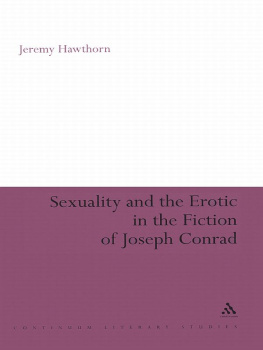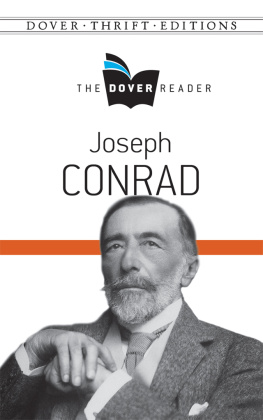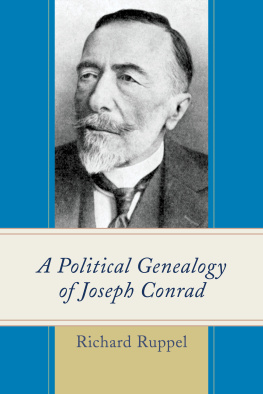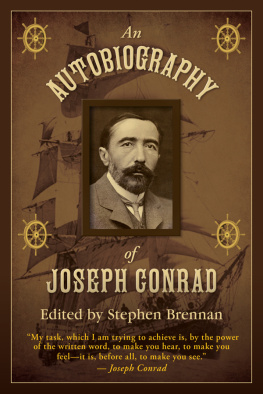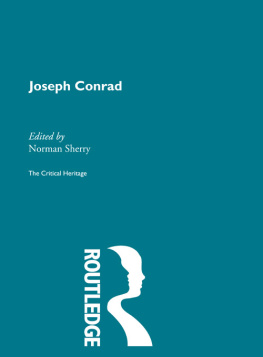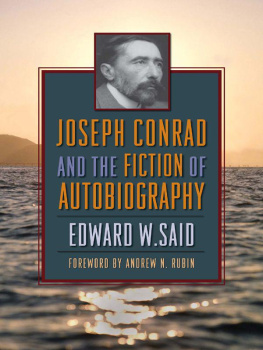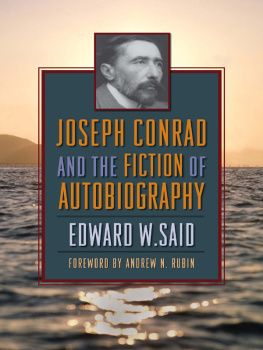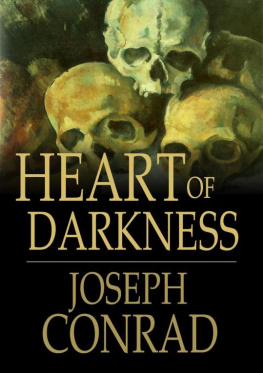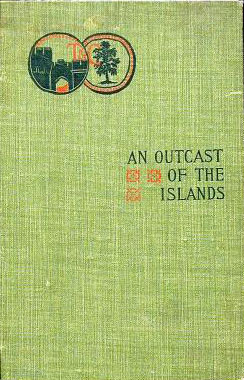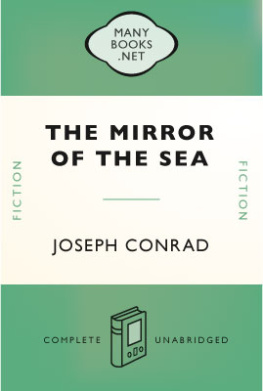Sexuality and the Erotic in the Fiction of Joseph Conrad
CONTINUUM LITERARY STUDIES SERIES
Also available in the series
Active Reading by Ben Knights and Chris Thurgar-Dawson
Character and Satire in Postwar Fiction by Ian Gregson
Fictions of Globalization by James Annesley
Joyce and Company by David Pierce
London Narratives by Lawrence Phillips
Masculinity in Fiction and Film by Brian Baker
Novels of the Contemporary Extreme edited by Alain-Philippe Durand and Naomi Mandel
Romanticism, Literature and Philosophy by Simon Swift
Womens Fiction 1945-2005 by Deborah Philips
Sexuality and the Erotic in the Fiction of Joseph Conrad
Jeremy Hawthorn

Continuum
| The Tower Building | 80 Maiden Lane |
| 11 York Road | Suite 704 |
| London | New York |
| SE1 7NX | NY 10038 |
Jeremy Hawthorn 2007
All rights reserved. No part of this publication may be reproduced or transmitted in any form or by any means, electronic or mechanical, including photocopying, recording, or any information storage or retrieval system, without prior permission in writing from the publishers.
British Library Cataloguing-in-Publication Data
A catalogue record for this book is available from the British Library.
ISBN: HB: 0-8264-9527-3
9780826495273
Library of Congress Cataloging-in-Publication Data
A catalog record for this book is available from the Library of Congress
Contents

Acknowledgements

The author and publisher thank the following for permission to reproduce copyright material.
1. The Trustees of the Joseph Conrad Estate for permission to reproduce extracts from Joseph Conrads manuscript of Under Western Eyes (p. 147) and The Shadow-Line (p. 132).
2. Editions Rodopi BV, Amsterdam, for permission to reproduce in amended form the article Conrad and the Erotic: A Smile of Fortune and The Planter of Malata, published in Daphna Erdinast-Vulcan, Allan H. Simmons and J.H. Stape (eds), Joseph Conrad: The Short Fiction. Amsterdam: Rodopi, 2004, pp 111-41. This material forms part of Chapter 3.
3. Cambridge University Press, Professor S.W. Reid and Mrs Barbara M. Harkness, for permission to reproduce a number of extracts from Joseph Conrad, The Secret Agent, Bruce Harkness and S.W. Reid (eds), The Cambridge Edition of the Works of Joseph Conrad, 1990.
Chapter 2 is an expanded and amended version ofReading and writhing: the exotic and the erotic in Joseph Conrads An Outcast of the Islands, published in Charles Armstrong and 0yunn Hestetunn (eds), Postcolonial Dislocations: Travel, History, and the Ironies of Narrative. Oslo: Novus Forlag, 2006.
I owe warm thanks to John Stape, Jakob Lothe, Gordon Williams, Stephen Donovan, Allan Simmons, Daphna Erdinast-Vulcan, Paul Goring, Ruth Sherry, Domhnall Mitchell, Gail Fincham and many others for comments, conversations, and constructive criticisms. All errors and inadequacies in the book are of course my responsibility alone.
This book was started during a period of research leave granted by my employer, the Faculty of Arts of the Norwegian University of Science and Technology, Trondheim. I acknowledge with gratitude the generous provision of research leave offered by the faculty. The book was completed while I was working as a member of the Narrative Theory and Analysis team led by Professor Jakob Lothe at the Centre for Advanced Studies, Oslo, in the academic year 2005-6.1 would like to thank Professor Lothe, my fellow team members, the staff at the Centre, and the Centres leader Professor Willy streng, for their friendly, efficient, and collegial support and encouragement during a most productive year.
My especial thanks go to my wife, Bjrg. The questions she has asked me during her work translating three of Conrads novels have reminded me that however much critics talk about close reading, no-one reads more carefully than a good translator. I thank her for her unfailing support and good humour, and a shared dislike of housework that has left space for more pleasurable and useful occupations for both of us.
A Note on Presentation

Conrad is very fond of ellipses. In order to distinguish between Conrads ellipses and ellipses indicating that I have omitted a section from a quotation, all such omissions are marked by ellipses enclosed in square brackets thus [...]. However where I quote from critics who have marked their own omissions from quotations by means of a standard ellipsis, I have reproduced their own presentation without alteration.
In works such as Heart of Darkness where the bulk of the narrative is ostensibly delivered orally by a personified narrator to a group of listeners, standard editions indicate this by placing a quotation mark at the start of each narrated paragraph. I have retained such quotation marks when citing from these editions, although this may sometimes appear odd as a citation will include an opening, but not a closing, quotation mark.
References to letters included in volumes of The Collected Letters of Joseph Conrad (Cambridge University Press, 1983-) are indicated thus: (CL2), (CL3), etc. Full bibliographic details are provided in the bibliography at the end of the book. This bibliography also contains information about all sources from which quotations are taken.
For my wife, Bjrg
who will dust
Introduction

Conrad and sexuality
Wouldnt it be easier to write about Henry James and water-skiing? The response of friends and colleagues to the news that I have been writing a book about the sexual and the erotic in Joseph Conrads fiction has not generally been that this is a subject crying out to be tackled. Such a view of Conrads fiction is, I have come to believe, part of a self-confirming circle of assumptions and non-discoveries. The surest way to fail to discover something in a writers work is to start off with the conviction that it is not there or alternatively, that if it is there, it is not worth investigating.
In more serious responses, a general attitude of scepticism towards the project can be sub-divided into three related contentions. First there is the claim that Conrad the man was about as uninterested in sexuality and the erotic as it is possible for any mature male not technically a eunuch to be, and that this biographical truth is reflected or refracted in various ways in his fiction. Second, while it may be conceded that Conrad did indeed attempt to write about sexuality and the erotic, the concession is followed by an insistence that the attempt had an invariably negative effect upon his art. And third there is the counter-assertion that Conrad is essentially a political novelist whose art is important only when it engages with the public and the impersonal, and that it becomes trivial and embarrassing when it investigates the complexity of individual feelings and relationships, especially those concerned with the passionate and the erotic.

